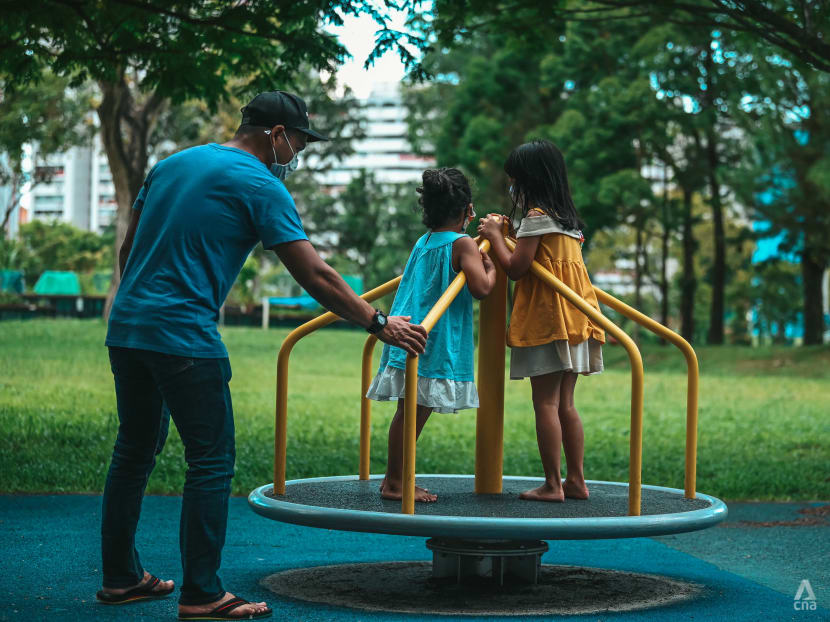'Time-poor parents': Most young children in Singapore get excessive screen time, KKH survey shows
New guidelines for young children's daily activities have been launched by a research group led by KK Women's and Children's Hospital.

A father playing with his children at a playground. (Photo: CNA/Hanidah Amin)
- Among the new guidelines: No more than one hour of recreational screen time a day is recommended for pre-schoolers aged three to seven years and toddlers aged 18 months to three years
- Toddlers under 18 months and infants should not get any screen time at all
- Daily outdoor play is encouraged for toddlers and pre-schoolers, who should get at least 180 minutes of physical activity every day
SINGAPORE: Most children aged three to seven in Singapore spend more than the recommended amount of time looking at screens for recreation – exceeding a research group's guideline of not more than one hour, with many even getting two hours a day on weekends.
The findings from a survey by KK Women's and Children's Hospital (KKH) were released on Friday (Jan 21) together with a new set of activity guidelines for young children aged seven years and under.
The survey of 340 parents from September to October last year found that time allocation for physical activity, sleep and recreational screen viewing were "suboptimal" among young children.
There was a general lack of awareness, with more than half of the parents wrongly estimating the recommendation durations of time for physical activity and recreational screen use, said KKH.
The survey results helped to inform new early childhood guidelines developed by the KKH-led Integrated Platform for Research in Advancing Metabolic Health Outcomes of Women and Children (IPRAMHO).
The guidelines include strategies to reduce Singapore's childhood myopia rate, which is among the highest in the world. They also include ways to "promote family unit practices as most Asian parents are time-poor", said the hospital.
Related:
EXCESSIVE SCREEN TIME
Under the new guidelines, children of pre-schooling age – between three and seven years – are recommended to have no more than one hour of recreational screen time a day.
However, KKH's survey found that 75 per cent of pre-schoolers had an average one hour of recreational screen viewing time on weekdays, while 95 per cent had an average two hours a day on weekends.
Excessive screen time was also seen in the younger age groups. The guidelines recommend no screen time for infants under 12 months and toddlers up to 18 months. Toddlers aged 18 months to three years should get less than one hour.
Instead, the survey found that 30 per cent of infants were given one hour of screen time a day. As for toddlers under 18 months, 70 per cent of them viewed screens for half an hour on weekdays. This figure rose to 80 per cent on weekends.
Researchers said that parents who role-model healthy recreational screen time encourage healthy habits in children.
However, half of the parents surveyed said they only occasionally limited their recreational screen use when spending time with their children, while 1 per cent said that they never do.
The findings reflect the "lifestyle patterns of typical urbanites including Singaporeans", said KKH consultant Dr Benny Loo, who also chaired the work group for the guidelines.
"Time-poor parents are not putting sufficient emphasis on activities for children and relying heavily on electronic devices for the children's activities and even child minding. COVID-19 has worsened the situation.
"Our young children are kept at home more, have fewer social interactions and physical activities, using electronic devices for longer periods of time, and sleeping less."
PHYSICAL ACTIVITY AND SLEEP
The guidelines also cover recommended durations of physical activity: At least 180 minutes for toddlers and pre-schoolers, with daily outdoor play encouraged, and 30 minutes of "tummy time" for infants, during which the baby is laid on his or her tummy as a form of exercise.
However, the survey found that 40 per cent of toddlers and pre-schoolers averaged only 90 minutes of physical activity, while 40 per cent of infants were given only 15 minutes of tummy time or floor-based play.
The guidelines also advise avoiding screen time 30 minutes before bed, and stipulate recommended sleeping durations for the various age groups.
The survey showed infants aged zero to three months had the largest proportion who were not getting enough sleep, with 35 per cent sleeping for eight to 11 hours daily instead of at least 14 hours as recommended.
Eating habits and diet are also covered in the guidelines, which were developed based on locally and globally established studies and best practices as well as the survey.
KKH said this is the first set of integrated activity guidelines for early childhood in Singapore. It is part of a series by IPRAMHO that also includes guidelines for children and teens aged seven to 18 years, which were released in 2021.
IPRAMHO is one of the main programmes by the research institute on maternal and child health at KKH that launched last year, said the hospital.
Emerging evidence over the past five years show that physical activity, sedentary behaviour and sleep for young children are closely related, said senior consultant Professor Tan Kok Hian, lead investigator of the research group.
Eating behaviours and calorie intake are also linked, and "together, these have a significant impact on a child's health outcome".
"We are laying the foundation for transformation of our nation's health for generations to come," said Prof Tan.
Editor’s note: An earlier version of this story said guidelines for children and teens aged seven to 18 years were released in 2020. This has been amended to 2021 following a clarification from KKH.







